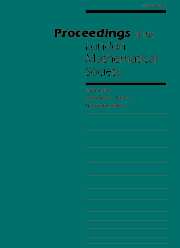Article contents
COHOMOLOGY OF QUANTIZED FUNCTION ALGEBRAS AT ROOTS OF UNITY
Published online by Cambridge University Press: 01 March 2000
Abstract
Let $G$ be a simply-connected, semisimple algebraic group over $k$, an algebraically closed field of characteristic zero. Let ${\cal O}_{\epsilon}[G]$ be the quantized function algebra of $G$ at a primitive $\ell$th root of unity $\epsilon$, and let $\overline{{\cal O}_{\epsilon}[G]}$ be the `restricted' quantized function algebra at $\epsilon$, a finite-dimensional $k$-algebra obtained from ${\cal O}_{\epsilon}[G]$ by factoring out a centrally generated ideal. It is known that $\overline{{\cal O}_{\epsilon}[G]}$ is a Hopf algebra. We study the cohomology ring $\mbox{Ext}_{\overline{{\cal O}_{\epsilon}[G]}}^*(k,k)$, a graded commutative algebra, and, for any finite-dimensional $\overline{{\cal O}_{\epsilon}[G]}$-module $M$, the $\mbox{Ext}_{\overline{{\cal O}_{\epsilon}[G]}}^*(k,k)$-module $\mbox{Ext}_{\overline{{\cal O}_{\epsilon}[G]}}^*(k,M)$. We prove that for sufficiently large $\ell$ there is an isomorphism of graded algebras\[ \mbox{Ext}_{\overline{{\cal O}_{\epsilon}[G]}}^*(k,k) \cong k[X_1,\ldots ,X_{2N}],\] where each $X_i$ is homogeneous of degree $2$, and $2N$ equals the number of roots associated to $G$. Moreover we show that in this case $\mbox{Ext}_{\overline{{\cal O}_{\epsilon}[G]}}^*(k,M)$is a finitely generated $\mbox{Ext}_{\overline{{\cal O}_{\epsilon}[G]}}^*(k,k)$-module. We also show under much less restrictive conditions on $\ell$ that $\mbox{Ext}_{\overline{{\cal O}_{\epsilon}[G]}}^*(k,k)$ continues to be a finitely generated graded commutative algebra over which $\mbox{Ext}_{\overline{{\cal O}_{\epsilon}[G]}}^*(k,M)$ is a finitely generated module.\vspace{6mm}\noindent 1991 Mathematics Subject Classification: 16W30, 17B37, 17B56.
- Type
- Research Article
- Information
- Copyright
- 2000 London Mathematical Society
- 8
- Cited by


